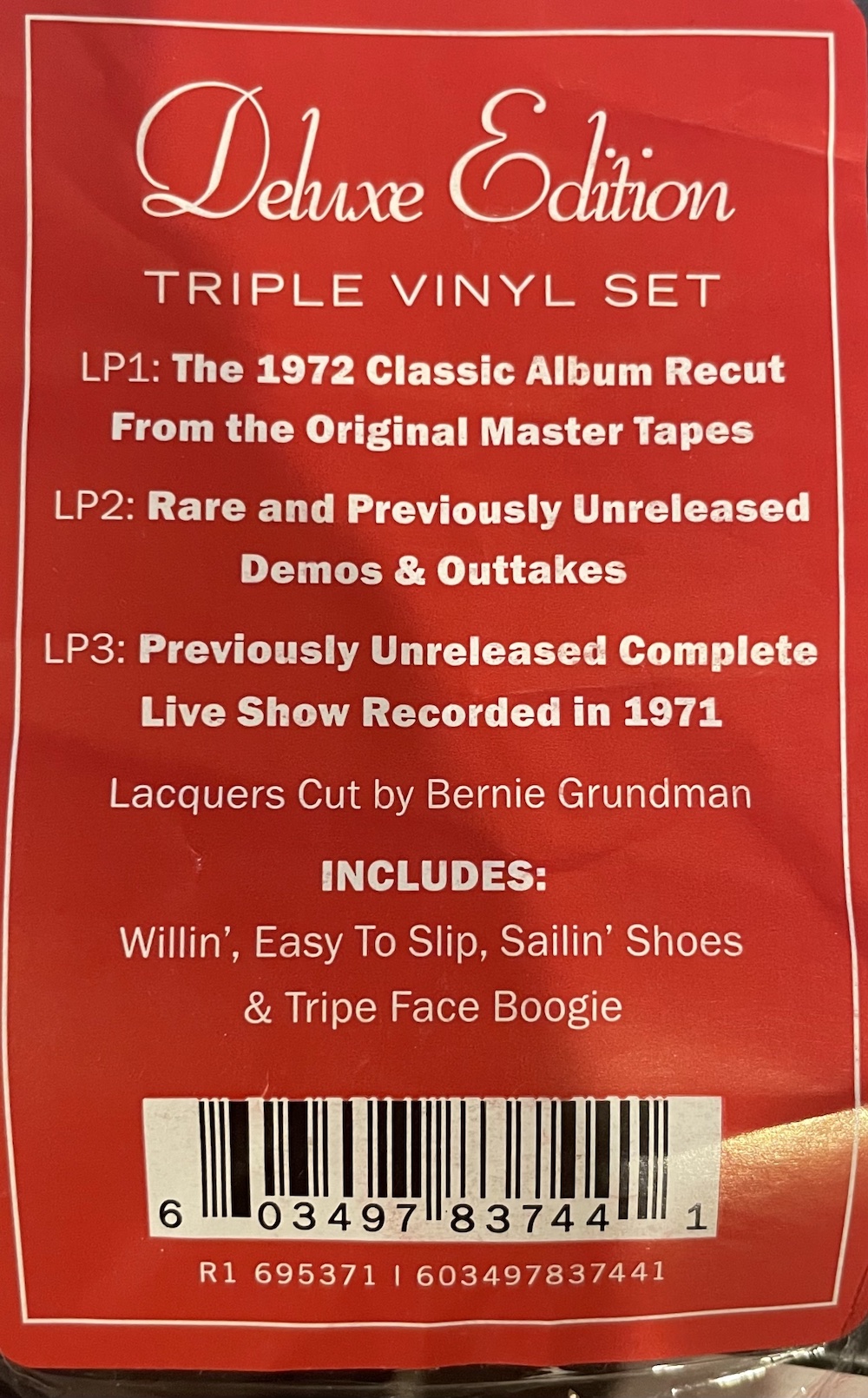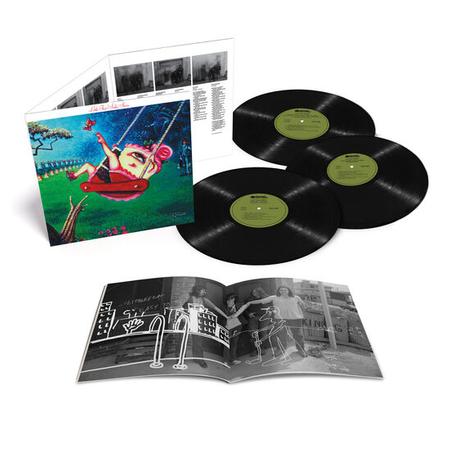Rhino Reissues Deluxe Triple LP "Sailin' Shoes" (Revised Review+ Video)
it's so easy to slip
Music fans living in Boston during the 1970s should be forgiven for mistakenly thinking Little Feat's 1972 release Sailin' Shoes was a huge hit. The album got major airplay on WBCN-FM and rave reviews in the local alternative press and in the pages of Fusion magazine, Boston "answer" to Rolling Stone (I wrote for it), but, in fact, even though the album was one of those "soundtrack to our lives" records in Boston and in a few other major markets, the album was a flop. It probably sold at most around 15,000 copies. A pathetic number for an album arguably as good as if not better than Exile on Main Street—it was certainly as raw, raunchy and thoughtful. And I'm not kidding about that.
Lowell George, the quartet's leader, never had rock star charisma but his scorching slide guitar spoke it for those willing to listen (as if it could be ignored!). He was a child of Hollywood who once appeared on The Ted Mack Amateur hour, but he rejected the star trappings and even, for a short period of time being a performer altogether.
But soon he was back in his own band, The Factory, then briefly in the Standells and finally he was a member of The Mothers of Invention, during the inventive period of Burnt Weenie Sandwich and Weasels Ripped My Flesh.
After leaving or being fired from The Mothers, George formed Little Feat with Bill Payne and Richie Hayward— guys who would remain the band's core for many years, even following his death—and Roy Estrada who quickly left for Captain Beefheart. The eponymously titled Russ Titelman produced Warner Brothers debut featured the signature "country" song "Willin'" and another debut album standout, "Hamburger Hamlet".
Sailin' Shoes moved the group into the top tier of the era's rock groups, charts be damned. The band threw so much at listeners musically, and lyrically, it might have been too much—that was Lowell George's reasoning for the lack of sales according to David Fricke's crisply written 2022 annotation in the full-sized booklet also filled with great photos including one full sized shot of the master tape. More about that later!
The by then expanded to six group played Paul's Mall on April 1st, 1973 and I was there. With Lowell George's permission I set up my Sony SD-152 SD stereo cassette recorder and recorded the late show in stereo on Advent Chromium Dioxide tape. It sure sounded great through headphones but as I was packing up someone stole the tapes off the table. Some of the early show was broadcast on WBCN. Some of the late show is on YouTube identified as an "audience recording". Mine was way better than this sounds but who knows?
After the show I went up to Lowell who was standing at the bar and I apologized for the tape being stolen because those were the days of bootleg LPs and chances were good this one would get that treatment. It was in stereo and with chrome tape and Dolby it was quiet.
While telling me not to worry about it he took a joint out of his pocket, handed it to me and said "smoke this and forget about it!" Of course I didn't forget about it but I did stop worrying.
The signature song "Willin'" about a trucker out on the Interstate "willing'" to haul freight if you give him "weed, whites and wine" is a genuine country and western show stopper and in no way a genre parody. It's emblematic of the band's preoccupation with minor players writ large and the "other" side of town. The album opener, "Easy To Slip" about a failed relationship (in the notes here we learn it's about the lyricist's failed marriage) is filled with regrets large and small—"The whole word seems so cold today, all the magic's gone away and our time together melts away like the sad melody I play." "Cold, Cold, Cold" is exalted griping: "...don't you know I'm lonely and i wish the world would get off my case and get one of its own".
There'a "Teenaged Nervous Breakdown"—a manic Jerry Lee Lewis-like rocker, that's followed by the darker "Got No Shadow", and a song about leaving behind the era's political turmoil "A Apolitical Blues". Bill Payne's "Cat Fever" begins "living' in strange dreams takin' prescription medication where will it take me?"—and from there it gets more desperate.
Yet if you know these songs, they are not songs of self-pity. Just the opposite and they are delivered, where appropriate, with exuberant humor. The ones with a New Orleans twist have to. It's difficult to pick a favorite because there's not a bad one among them and each has its own fully explored world view but the one that always gets me is "Trouble"—I use it whenever something goes wrong wherever and whatever I'm doing, there it is! "You yelled hey when your car wouldn't start, so you got real nervous and started to eat your heart out..." Recite those lines or better sing them with an exuberant "hey!" and your troubles will melt with laughter.
The album closer, a droll number about an adventure on the road, a seedy hotel room dream-like reminiscence, ending with a return to reality and this colorful non-sequitur "cause outside my hotel window is a sign that turns from red to green it says chop suey and join the u.s. marines." That is aways a "WTF?" moment and so right! Guests on the record include Ron Elliot from The Beau Brummels, percussionist Milt Holland and the ubiquitous Warner Brothers all-star Van Dyke Parks.
I have to admit I'd not played the album in a long time (too long), so when this arrived I immediately put it on the turntable and re-lived it from beginning to end, fully appreciating its hard-rocking, bluesy, slinky boogie brilliance and humor as well as Neon Parks' (real name Martin Muller) surreal cover—a takeoff on "The Swing", a mid 18th century French painting, here illustrating a layer cake on the swing, with eyes, legs and a slice taken out between the thighs with a snail looking to gain entrance—with a high-heel red "sailin' shoe" flung from one foot. There's also a "Blue Boy" take-off with a suggestion of MIck Jagger lips. The reissue's colors are either correct for the first time or off by a lot, with cherry red replacing the original's more modest orangey tint.
As the annotation confirms decades of plays, "Easy to Slip" features odd musical terrain of tabla-like percussion, backward guitars, B-3 underpinnings and organized mayhem that this first play sounded better organized than I'd ever heard it. The entire album sounded better organized than ever, and sharper edged too. (one annotation "oops" nearby: Fricke refers to the finale "Texas Rose Cafe" as "Texas Road Cafe" and no one caught it).
Before going any further let me slip in something here that I was going to add to the Rough Mix review, which is a short discussion about what exactly should a reissue accomplish? With Rough Mix you've got an acknowledged sonically brilliant, in a modest, natural-sounding sort of way, recording not in need of revision. No need for added bass, more "glisten" or anything and certainly no need for added compression. Astley's re-imagined version adds nothing and subtracts a great deal as if he's changed the mix just to change it and create something different that puts accents in different places. It destroys the intimacy of the original, which seemed to be the point, and it adds compression for no possible purpose.
So what should a reissue accomplish? Should it try to sound like the original pressing? Should it be accurate to what's on the tape? Should it try to sound like the original pressing only better? What should it do? In the case of acknowledged great originals, I'd say try to duplicate that sound. In cases where you know the originals were compromised for technical or other reasons, such as the Blue Notes where RVG had to seriously compromise bottom end and dynamics, which was not his intent, do what the Tone Poet series does: give you what's on the tape, which is what Rudy wanted to put in the grooves but couldn't. Same with what was done with the Beatles mono box: give listeners what's on the tape and don't attenuate the bottom end, which had to be done on the originals. Reissue producers often have to deal with sonically deteriorated tapes or use copies where masters no longer exist, etc. Every reissue producer faces different issues.
Here, after the first casual play, the reissue seemed true to the original with a bit of added bottom end (or fully expressed what's on the tape?) and some extra punch. But then I played the original—a promo copy played for fifty years!— and learned more about how my system has been greatly improved since I last played the original. On the title track, the individual background vocalists were now so much easier to hear as separate three-dimensional voices in space and the attack delicacy has ridiculously improved. The subtle bass line underpinning the title track was now so cleanly rendered.
All of what I thought were reissue improvements were also there on the original, but they sounded far more real. Yes there's more bass and what sounds like a bit more compression on the reissue and it's cut louder but it sounds crunchy and not nearly as "real" sounding. Not by a lot. On "Cat Fever" there is a delicate piano line that's there on the original—floating gently in space on the right channel. It's pasted not so delicately on the speaker on the reissue. Why does the reissue sound so fundamentally different yet the same, which usually is what a digital file produces. On "Cat Fever" during a break Hayward delivers 1/8th note cymbal hits that on the original are clean, correctly bright with believable transient hits and utmost transparency. On the reissue they sound thick and almost dull. I've played this for other good listeners and all heard it this way too. Can it be that the fifty year old tape has deteriorated to sound like this?
Speaking of seeing what you hear here are Audacity images identified. As you can see, though they are not precisely the same section of music, the reissue has not been "picket fenced" (compressed). That's good!

 Based on how this record sounds, I suspect it was cut from a file but the producer insists Bernie cut from tape. I should have believed the hype sticker, but how many times have we been burned before?
Based on how this record sounds, I suspect it was cut from a file but the producer insists Bernie cut from tape. I should have believed the hype sticker, but how many times have we been burned before?
 What does "Recut From the Original Master Tapes" mean to you? What does the word "Cut" mean? To me it means "cut a lacquer". But below, well below it says "Lacquers but by Bernie This record sounds like it was cut from a digital file. Either that or I'm 100% wrong. I'm happy to eat my words if that's the case. Revision: That's the case. I'm munching on my words.
What does "Recut From the Original Master Tapes" mean to you? What does the word "Cut" mean? To me it means "cut a lacquer". But below, well below it says "Lacquers but by Bernie This record sounds like it was cut from a digital file. Either that or I'm 100% wrong. I'm happy to eat my words if that's the case. Revision: That's the case. I'm munching on my words.
Once, a few years ago I played a box set reissue, the name of which I can't divulge, and was certain it was cut from files. The producer in a huff emailed to say it was all analog but when I spoke with someone at the mastering house, off the record, he admitted it was cut from files. I can't name names. So my ears told me one thing, the producer here tells me another and says he has the proof. I'll take his word. Bernie Grundman is reticent to speak about these issues (mastering engineer/client privileges) but the producer Jason Jones, was not. I'm going to post files on YouTube and you can listen for yourself when that's posted. However, as I wrote above: this is a good reissue that does not attempt to "rewrite sonic history" as the Rough Mix pointlessly does.
As for the other two LPs in the set, one is filled with interesting demos, alternate versions—the usual, of interest mainly to "completists" and hardcore fans (to whom this set is aimed) only five of which have not been previously released. The third record is a live concert from August 28, 1971 at the band's beginning. Don't expect Waiting For Columbus! It's of interest only to hardcore fans, though of course, that's for whom this set was produced. It also shows that these were great musicians in search of their group sound. The singing is pretty raw too.
Two other points of interest:
1) Mobile Fidelity issued a 1/2 speed mastered version of Sailin' Shoes that the side one of which I can only describe as "defective". It's severely compressed and distorted. I can't believe anyone actually listened to it before releasing it to the public. Side two is far better and those cymbal hits survive well as you'll hear on YouTube.
2) There was a really great CD box set from 2000, Little Feat hotcakes & outtakes containing 4 CDs worth of LIttle Feat culled from sixteen Little Feat albums and my old friend Bud Scoppa's excellent annotation. There are those claiming that CDs actually sound way better than we thought when played back on the best of today's digital gear. Well, I played tracks from this box set on a dCS Vivaldi One Apex streaming DAC/SACD player and the box set sound does not make for particularly pleasant listening.
Revised Conclusion
Despite how it sounded to me, the producer insists and I believe him that the original album was cut from tape. I'm not sure why it sounds to me the way it does. It's certainly better than many "revisionist" reissues, but it has the grain and "thickness" heard on so many vinyl albums cut from digital files compared to originals. More than a few visitors noted it. The bonus material is less important, but for hardcore fans it's worth having. Lowell George died of a heart attack in 1979 at age 34. That's a damn shame. This mini-drama won't kill me.











































.png)








